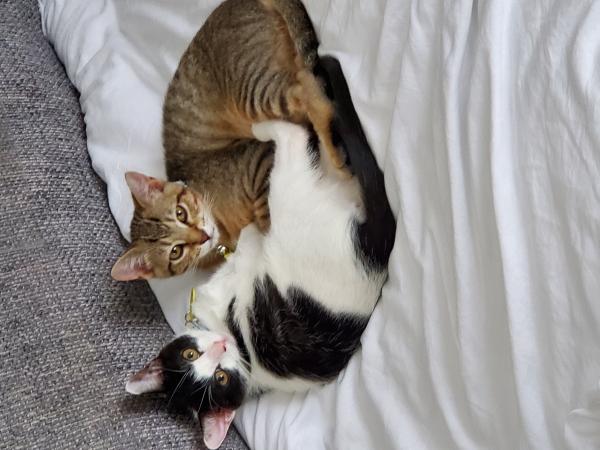Why Does My Cat Bite and Kick With Their Back Legs?



See files for Cats
Anyone who has lived with a cat knows how extremely affectionate they can be as companions. They may also know that they can sometimes seem to give mixed signals. One minute you are enjoying a pleasant nuzzle, the next they are biting your hand and kicking you with their back legs. They may even wrap their claws around your wrist and hold tight, often causing some serious scratches when they bunny kick your arm with those sharp talons.
Since this situation causes a lot of confusion, AnimalWised asks why does your cat bite you and kick their legs? We find out how understanding this feline behavior can lead to a much more harmonious household.
Why is my cat biting and kicking me?
While often painful for us, biting and kicking are part of a cat's natural behavior since they are kittens. When kittens bite and kick, it is part of their development. They are training to know how to be adults and to navigate their world. In the wild, cats will need to hunt and defend themselves. Without knowing how to exercise these behaviors, they will be unprepared for an often dangerous existence.
During play, kittens bite, scratch and kick, learning from their mother and littermates how to engage. While it can often look quite dangerous, it is healthy behavior and involves learning necessary boundaries.
A cat biting and bunny kicking with their back legs is common tactic used in hunting. While a cat will stalk their prey, it is not always easy to disable them when they finally catch up. By wrapping their front paws around an animal's neck, they can then bite their jugular with their mouth and make a fast kill. By kicking their back legs, they can then claw at the animal's abdomen and may be able to disembowel them.
When we put our arm near the cat to pet them and they are in a playful mood, it makes a good replacement for a prey animal. Our wrist is like a neck and our hand like an arm. The cat should know we are not a threat, but it may still exercise this behavior as a form of play. You will often see a cat do the same to another cat.
Due to domestication, youthful behavior in cats can often remain until their adulthood. This is because the games provide them with mental stimulation and allow them to exercise innate behaviors which are not afforded them by living with humans. While cats in the wild will still play, they generally do not need to do it in the same way as domestic cats. They do not maintain the same ‘kitten’ behaviors for as long.
Although play fighting is often tolerable in cats, it is not always a healthy expression. Some cats do not adapt to living with humans as well as others. When they bite and kick us painfully and without warning, it can be a hazard. Aggression in cats should not be tolerated, but we also need to have understanding. Often it is due to a an educational or developmental issue.
When an adult cat bites and bunny kicks us with their back legs, it shouldn't hurt or break the skin. If it does, it means they haven't learned bite inhibition. Bite inhibition is vital as it allows the cat to exercise their instinctive behavior, but without hurting another animal or person. Cats which do not learn this may injure another even if they do not mean to. While kittens biting do not usually cause harm, once fun and harmless bites can become dangerous.
One of the most common reasons for this is poor socialization. A cat which has been removed from their mother and siblings too soon will often not know how to behave correctly. Also, if they have had a negative experience with humans, they may also be lashing out and biting because they are scared.
My cat bites and kicks me when I pet them
Sometimes you may find your cat bites and kicks you with their back legs seemingly for no reason. This is often the case when you are petting them. When a cat bites you and kicks you with their hind legs without warning, it is usually because a line has been crossed. Finding out what the line is will depend on the individual.
While some cats will be fine with having their belly petted, most do not enjoy it. This can seem strange, especially when so many cats will expose their belly to a human seemingly inviting them to pet their belly. A cat's undercarriage is a sensitive area. A cat may claw with their back legs to kill prey because they know which part of the animal is most vulnerable. When we try to pet them there, they often feel uncomfortable due to such vulnerability.
If you are petting a cat somewhere they normally well tolerate or even enjoy, this could be a sign of an irregularity. Cats are good at not showing pain, something which can be unhelpful in recognizing there is a problem. If we stroke them somewhere they have been injured or if there is an internal problem we can't see, the cat may bite and bunny kick because it hurts. A visit to the veterinarian is advisable in these circumstances.
Although we may think that the cat bunny kicks or bites without warning, there may have been signals we have ignored. Cats have a specific body language which can alert us when we are overstepping their boundaries. They may have warned you by flattening their ears, whipping their tail or using another calming signal to tell us to stop. Our article on cat body language can help you learn more.

Is my cat aggressive?
In most cases, the cat is not being aggressive. Although they may bite and bunny kick you with their back legs, they may not be doing it in an aggressive manner. Even if their behavior is rough and tumble, it doesn't mean they mean to cause harm.
When a cat is being aggressive, the reason is usually due to fear. While there is a genetic predisposition for some cats to be more fearful than others, it is usually fostered by upbringing and environment. One of the most acute causes of fear is trauma. If a human has hurt them in the past, it is understandable they will be fearful of them in later life. Sometimes, this fear can be developed when human guardians mishandle the cat, even if they don't intend to cause any pain.
Also, cats can become overattached to certain individuals. In these cases, they may become aggressive to others, even if they are affectionate towards their main caregiver. Poor education also means the cat might become aggressive due to a lack of understanding their environment. In general, a cat's security is important. They need food, shelter, comfort and to be free of stress. If any aspect of their security is threatened for whatever reason, they may become aggressive.
What to do if my cat bites and kicks me with their back legs?
Hopefully, the above scenarios should be able to help you understand why your cat has begun to bite and scratch. It should also be clear that the reason is not because the cat is ‘bad’. but that they are acting out of fear or ignorance. We also need to be sure we recognize the information cats are trying to communicate to us through their body language to ensure we are not indirectly causing the cat to be aggressive.
It is important to note that we should never scold, hit or in any way negatively reinforce perceived bad behavior. If we do so, the cat will not only struggle to change their behavior, but we will exacerbate existing behavioral problems. Instead, the best ways to stop a cat from biting and kicking their back legs are:
1. Stay still
In the event that your cat bites you and holds tight biting and kicking, you should try to remain completely still. If they are only play-fighting with you, then they will stop when they think you have submitted. On the contrary, if you start to wriggle or appear as if you are fighting back, they may take it as encouragement to keep playing. If they are attacking because they are afraid, they may continue because they think you are still attacking them.
2. Do not talk to or pet them
Additionally, it may be counterproductive to speak to them to get them to stop. They may feel like your speech is trying to reassert this behavior. When you pet them, they may similarly interpret this as encouragement. However, you may be able to say something loudly and curtly such as ‘hey!’ or ‘stop!’ and remove your hand. In this way, the cat will know that they have reached their bite limit and playtime is over. This mimics the behavior of puppies which will quickly react by showing pain and walking away when another puppy bites too hard.
Ideally you shouldn't play with your cat using your hands. Hand contact should be restricted to petting and affection. Instead, you should use toys to play with them which help to exercise their hunting extinct without seeing you as something to hunt. You can even make your own with our article on DIY toys for cats to help encourage a healthier type of play.

3. Understand your cat
When your cat bites then bunny kicks you with their back legs when you try to pet them, it is possible it is because you do not understand them. Our own actions may be encouraging the behavior due to such lack of understanding. For this reason, it is vital we know how to interpret their body language. This way we can know whether the cat is more or less receptive to certain actions.
By knowing a cat's limits and avoiding inappropriate behavior, we will have already taken a very important step. Many cats in the long-term can become very unfriendly and aggressive, something which can be difficult to change if they have been negatively reinforced for so long. For further reference, check out our complete guide on cat behavior.
4. Let him approach you
Another important way of changing how you interact with your cat is to let them approach you. This is an important way to establish a bond of trust. Allowing the cat to approach of their own free will helps them to feel secure and in charge of a given situation. You will also know that when they approach you, it is because they want to have an interaction.
When they do approach you, you can reward them by using positive reinforcement. In these circumstances, they will start to associate you with positivity and feel less likely to be threatened and attack.
5. Pet them in the right place
Finally, if your cat bites you and scratches with their back legs, you may need a refresher on how to pet them correctly. For example, cats like to be rubbed on their ears, top of their head and along their back. Generally, they do not like their paws or undercarriage to be touched.
However, cats are also individuals. They will have their own preferred places to be petted. You will only know where is inappropriate and where they like to be petted by getting to know these preferences. To get started, you can take a look at our article on how to pet a cat properly.
If you want to read similar articles to Why Does My Cat Bite and Kick With Their Back Legs?, we recommend you visit our Behavioral problems category.






 I adopted my first kittens (brothers) last November. Before I go to bed I make sure they have food and water. They do sleep with me off and on during the night. But around 230am, they both pur and rub my face with their paws until I finally get up. I am not sure how to stop them from doing this.
I adopted my first kittens (brothers) last November. Before I go to bed I make sure they have food and water. They do sleep with me off and on during the night. But around 230am, they both pur and rub my face with their paws until I finally get up. I am not sure how to stop them from doing this.



